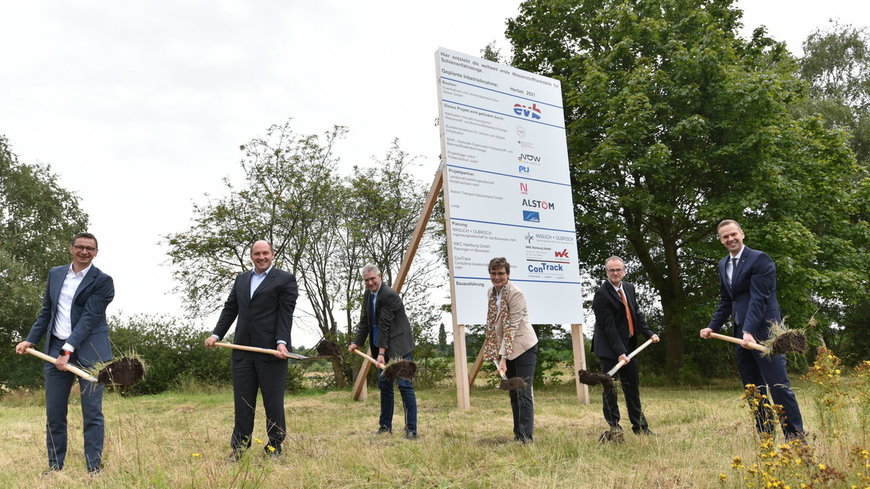lerail.com
28
'20
Written on Modified on
Bremervoerde accueillera la première station de recharge hydrogène au monde destinée aux trains passagers

Bremervoerde, July 28, 2020 - The world's first hydrogen charging station for passenger trains will begin construction in September in Bremervoerde, Lower Saxony. Representatives of the state government of Lower Saxony and the companies involved in the project gathered at the site today for a revolutionary and symbolic ceremony. The eighteen-month test phase for the first two trains was successfully completed at the end of February. This mobility project, which the whole world is watching with attention, is entering a new phase today.
Linde, a gas and engineering company, will be responsible for the construction and operation of the hydrogen charging station near Bremervoerde station, on behalf of the Lower Saxony Transport Authority (LNVG) . The other partners in the project are the manufacturer of railway vehicles Alstom, the State of Lower Saxony and the Elbe-Weser Transport and Railways Company (EVB).
The hydrogen charging station, which should be ready by mid-2021, will replace the current mobile charging solution. With a capacity of nearly 1,600 kg of hydrogen per day, it is nominally one of the largest hydrogen charging stations in the world. From 2022, 14 regional hydrogen trains, supplied by Alstom, will be replenished there daily and 24 hours a day if necessary. Boasting a range of 1,000 kilometers, these multi-unit trains will be able to run all day without producing any emissions on the EVB network, with just one filling. The hydrogen will be produced later on the site of the recharging station using electrolysis and renewable electricity.
“The groundbreaking ceremony for the first hydrogen filling station for passenger trains is a milestone for a flagship demonstration project in Lower Saxony,” said Carmen Schwabl, Managing Director of LNVG. The initiative to test gas as a fuel in local passenger rail transport came from LNVG.
"We are happy to take an active part in this innovative and major project in the world," said Mathias Kranz, Linde responsible for on-site activities. “Linde has a long history of hydrogen, which can make a significant contribution to decarbonisation. Its use as fuel for trains will greatly reduce the burden on the environment, as one kilogram of hydrogen replaces around 4.5 liters of diesel ”.
“The construction of the hydrogen charging station in Bremervörde will enable our emission-free hydrogen trains to operate in series on the Weser-Elbe network. We are delighted that Linde, with its hydrogen experience, is now also responsible for recharging series trains, following the success of the tests, ”comments Dr. Jörg Nikutta, Managing Director Germany and Austria of Alstom.
“We are proud to be the first railway company in the world to be granted authorization to operate fuel cell trains on the Weser-Elbe network. Our passengers have shown interest in the trains and their technology from the start. In addition to a very low noise level, the hydrogen train impresses with its ability to operate without emissions, especially in the current climate context. For our train drivers, operating the Coradia iLint was an additional motivation, ”says Andreas Wagner, Head of the SPNV division and authorized signatory of Eisenbahnen und Verkehrsbetriebe Elbe-Weser GmbH (evb).
The project is funded by the German Federal Ministry of Transport through its National Innovation Program for Hydrogen and Fuel Cell Technology. Digital Infrastructure NOW GmbH will coordinate the funding guidelines while Project Management Jülich (PtJ) will take care of the implementation.
About Coradia iLint
Coradia iLint is the world's first passenger train to be powered by a hydrogen fuel cell, which produces electrical energy for propulsion. Silent, this "zero emission" train emits only steam and condensation water. The train features several innovations: clean energy conversion, battery energy storage and intelligent management of motive power and available energy. Designed especially for non-electrified lines, it allows clean and sustainable operation.
www.alstom.com

